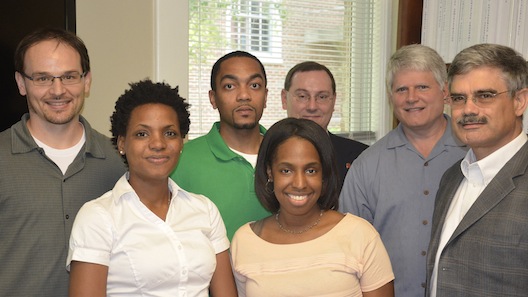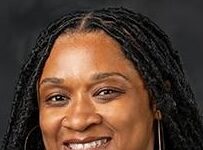 In 2010, the latest year for which complete data is available, only 54 African Americans earned a Ph.D. in chemistry. They made up 2.3 percent of all doctoral recipients in chemistry from U.S. universities that year.
In 2010, the latest year for which complete data is available, only 54 African Americans earned a Ph.D. in chemistry. They made up 2.3 percent of all doctoral recipients in chemistry from U.S. universities that year.
But this year, three African Americans earned Ph.D.s in chemistry at the University of Mississippi, a record for the institution which admitted its first Black students a half-century ago. Seven students in all earned Ph.D.s in chemistry this year at Ole Miss. Two were from Asia.
The three African American who earned Ph.D.s in chemistry are Kari Copeland of Coldwater, Mississippi, Margo Montgomery of New Orleans, Louisiana, and Jeffrey Veals of Gloster, Mississippi.
Kari Copeland also holds bachelor’s and master’s degrees in biochemistry from the University of Mississippi. She is going to conduct postdoctoral research at Jackson State University.
Margo Montgomery earned a bachelor’s degree in chemistry at Xavier University of Louisiana in New Orleans.
Jeffrey Veals holds bachelor’s and master’s degrees from the University of Mississippi. He will conduct postdoctoral research at the University of Missouri.
Shanna Stoddard, an African American student from Louisville, Kentucky, is on track to earn at Ph.D. in chemistry at Ole Miss in December. There are four other African American students in chemistry Ph.D. programs at the university.
Maurice Eftink, associate provost and professor of chemistry and biochemistry at Ole Miss, stated, “On average about 50 African American students receive Ph.D.s in chemistry nationwide each year, so the University of Mississippi produced 6 percent of the national total.”













Congratulations to the three African-American PhD graduates in chemistry from University of Mississippi. I really wish them great success and financial prosperity in their future research endeavors.
As a retired science teacher, I cannot understand why more African-American students do not study chemistry, physics, and biology at undergraduate, graduate and PhD levels.
I know that science syllabi are notoriously packed with content to learn. On the other hand, science subjects make great demands on visual memory, and plenty of study time to master the content. There are many memory aids that can be used to improve the learning of the subject content.
We need to coach more African-American students at an earlier age to study chemistry, physics, and biology.
We also need our Black students to go into chemical engineering, especially – oil and gas engineering. After all, the starting salary for a petroleum engineer is about $120,000 per year.
You cannot sneeze at a starting salary like that, especially when you have a big student loan to pay.
I am calling all African-American parents, especially, college educated ones to socialize their children, at home, to take an active interest in ‘home-based chemistry’.
The kitchen and bathroom, in particular are full of acidic and alkaline substances that can be the basis of many basic experiments.
Parents and their children can go on the Internet and Google ‘science experiments’ that can be done at home. This is the starting point of a life-long interest in chemistry.
Years ago, I took a group of children to the store with me to buy some paint. When we got back we went to the garden and I had them paint rocks in different colors. They loved it!
Let me fast forward that experience to 25 years later. One of the children, now a grown man, is now an architect. He told me that it was that experience of painting the rocks in the garden that was so etched in his mind that set him on a path to becoming an architect.
Children learn what they live, and they live what they learn.
“…I cannot understand why more African-American students do not study chemistry, physics, and biology at undergraduate, graduate and PhD levels.”
Mr. Delsol, I can only speak for myself. I have an undergraduate degree in microbiology/chemistry. In hindsight, it was not a wise choice. Though I was proficient in reading comprehension, I did not have the math/science foundation to do well in such a curriculum. And boy, did it show. My undergraduate days were a struggle. Plus, growing up, I was not aware of many African American scientists. I wish that I had known of a Dr. St. Elmo Brady, Dr. Percy Julian, Dr. J. Ernest Wilkins Jr. or Dr. David Harold Blackwell. As a matter of fact, it wasn’t until my freshman year of college that I came across a poster of famous African American scientists. I felt so ashamed that I was not aware of these brilliant men. During my public school days, I had heard of Dr. Drew and Dr. Carver, but, that was the level of my immersion in African American scientists.
I share your frustration. But, if we can’t get black kids to master reading, how are we ever going to get them interested in STEM? Dr. Freeman Hrabowski III stated that “Our children don’t learn to read clearly and critically at an early age. Reading is at the core of problem-solving in math and science” and “It all goes back to reading.” Let’s pray that we are able to get our children interested in intellectual pursuits.
Mike, I feel your pain! When I was growing up we had only one book at home- a Roman Catholic missal.
My mum and dad never taught my three brothers and I to read, because they spent all their waking hours scrapping and scratching for a living. Mum worked as a share-cropper, and dad as a fisherman.
My teachers taught my brothers and I to read. I cannot remember when it happened. When I first attended high school, I was painfully and shamefully aware how inadequate my reading and comprehension skills were. My friends had a rich vocabulary and mine was helplessly poor.
I recalled being introduced to science and I rather liked the feeling of learning and remembering scientific facts. Like you, I found math tough going, although I liked it.
I, also, studied micro-biology, and spent the first three years of my working life employed as a science laboratory technician. Racial discrimination stopped me from becoming a micro-biologist. I opted for teaching, instead.
Mike, you are right about the need for science role models. I had none, but in my family, one brother is a medical doctor and another a cosmetic chemist. His son is a senior research scientist with a major drug company.
I have been mentoring a 12th grade black male student for 46 days! He received his high school diploma today, May 31, 2012, at 7:30pm. I spoke with him earlier today, and he told me how much he has learned from me, in such a short space of time. Some of these young people are like sponges. They are hungry for information and encouragement.
We all need mentors at all stages in our lives, more so, as young people are transitioning from high school to college. Having taught at both high schools and colleges, I know where this young man is lacking, and what skills he needs to successfully navigate his years at college and in the work place.
You raised the question and at the same time encouraged minority students to strive toward graduate degrees in science. What was your highest degree and if it was not a Ph.D, why.
It all comes down to effective mentoring. My high school chemistry teacher was African American, but at that time I was not interested in science. But, as an undergraduate, I discovered that I liked it and was encouraged to pursue it. I earned my PhD in chemistry 12 years ago, one of 44 Blacks at that time. So, progress has been made, but not enough. A good mentor does not have to be the same race or gender to help a student achieve success. However, if a potential mentor has already “prejudged” the student regarding their abilities, they should not be mentors.
Nice!! Congrats, but the struggle still goes on. Underrepresented individuals need underrepresented mentors who really need to be recognized. Here is some advice:
(1) Don’t rest on your laurels, work hard and harder.
(2) Be patient!!
(3) Do network and stay around positive people who fear God.
(4) Believe in God. He knows your destiny.
Alvin A. Holder